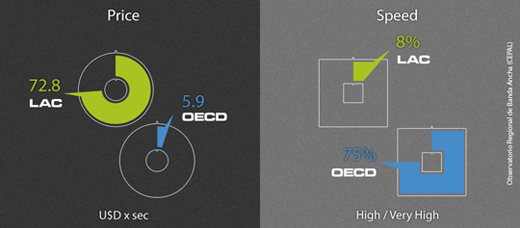Regional Priorities: Broadband and Internet Exchange Points
24/05/2012


The experts who participated on the broadband panel that was held in Quito within the framework of the LACNIC XVII meeting agreed that Broadband development is essential to the region’s economic growth as well as to increase the number of Internet users in Latin America and the Caribbean.
According to these specialists, expanding broadband leads to lower connection costs, a doubling of the speed of the service as perceived by users, and the inclusion of new segments of the population as beneficiaries of Information and Communication Technologies (ICTs).
Although notable efforts are being made to promote broadband connections within the region, there is still much work to be done. It is urgent to establish policies for developing this technology under a strategy that will also include networks and infrastructure, local content and applications, and Internet traffic exchange points between countries, highlighted those who participated on the Strategies for Broadband Deployment in Latin America and the Caribbean panel.
All panelists – Augusto Espín, Ecuadorean Vice-Minister of Telecommunications; Paulo Kapp of Telebras, Brazil; Fernando Rojas, ECLAC specialist; Miguel Angel Alcaine of the International Telecommunications Union (ITU); and Ariel Graizer, Chair of LAC-IX – highlighted the fact that the lack of broadband access in Latin America and the Caribbean limits the consumption of services based on information and communication technologies.
More than 200 participants attended this meeting. Sharing their experiences allowed identifying consensus on the importance of promoting Internet Exchange Points (IXPs), developing friendly regulatory environments, and promoting competition. The need for local content creation and the importance of promoting the installation of copies of global content were also highlighted.
In the opinion of Fernando Rojas, in order to take advantage of the technological advances brought about by the Internet each country should develop its own content. Broadband access has an economic impact at country level: according to the International Telecommunications Union, 10% penetration of this technology generates between 0.8 and 2.5 percent of Gross Domestic Product.
“Implementing broadband data transmission systems contributes to a country’s economic growth,” noted the ECLAC specialist.
(Free access, no subscription required)